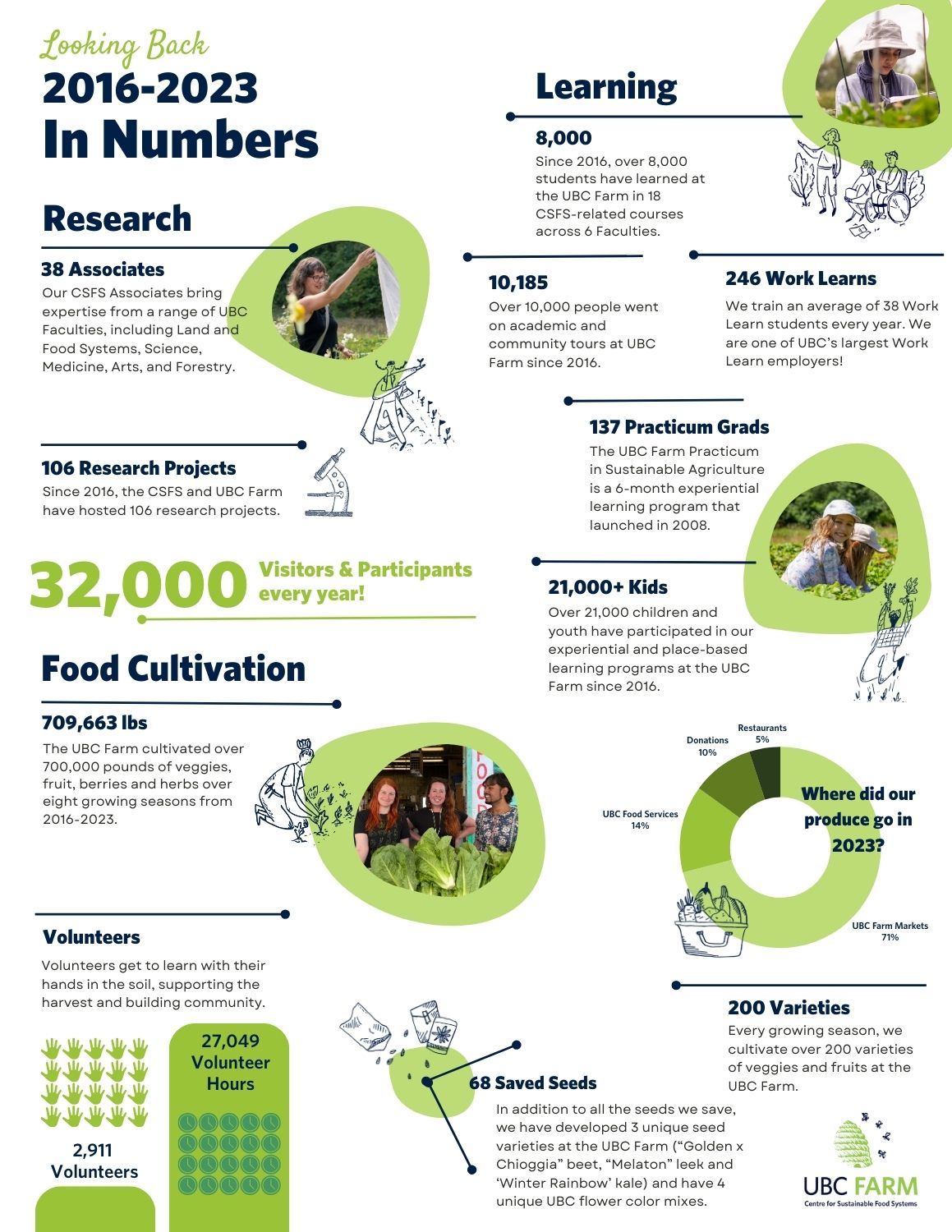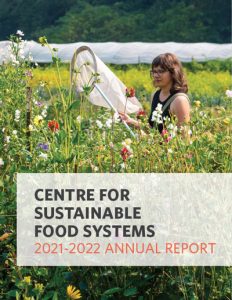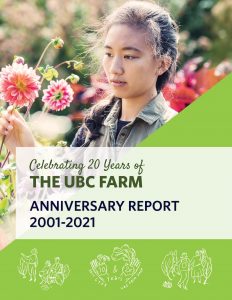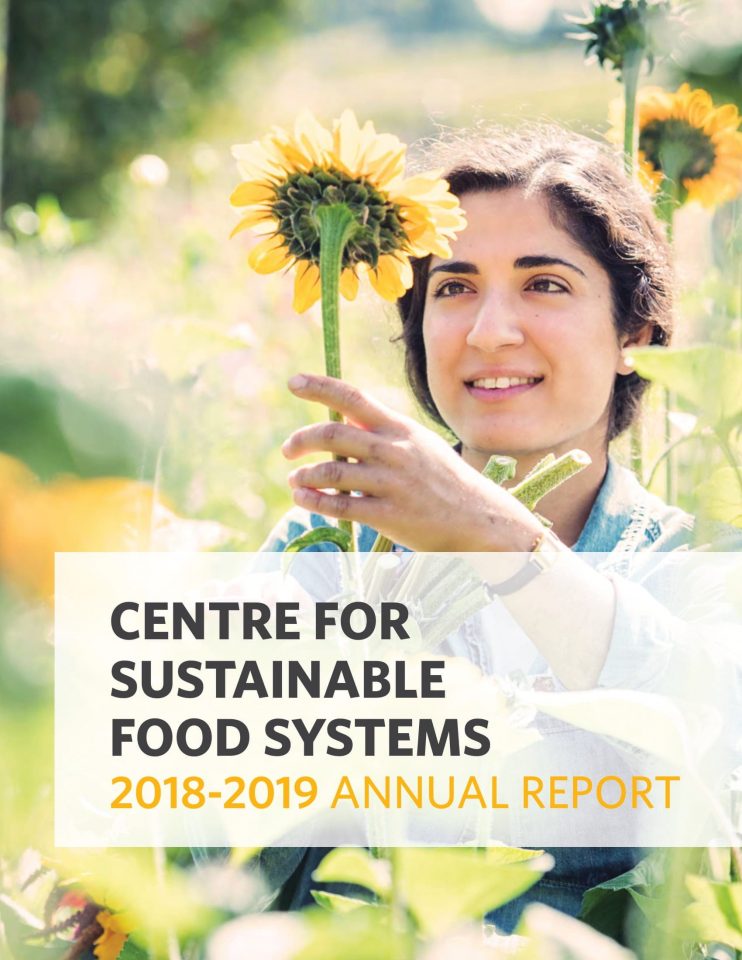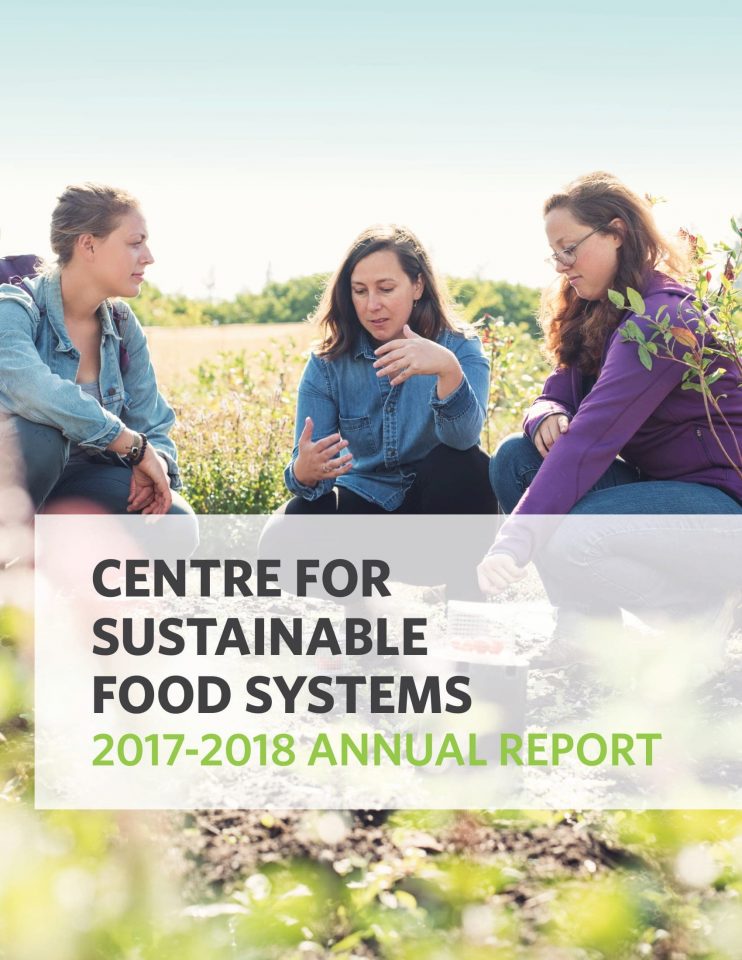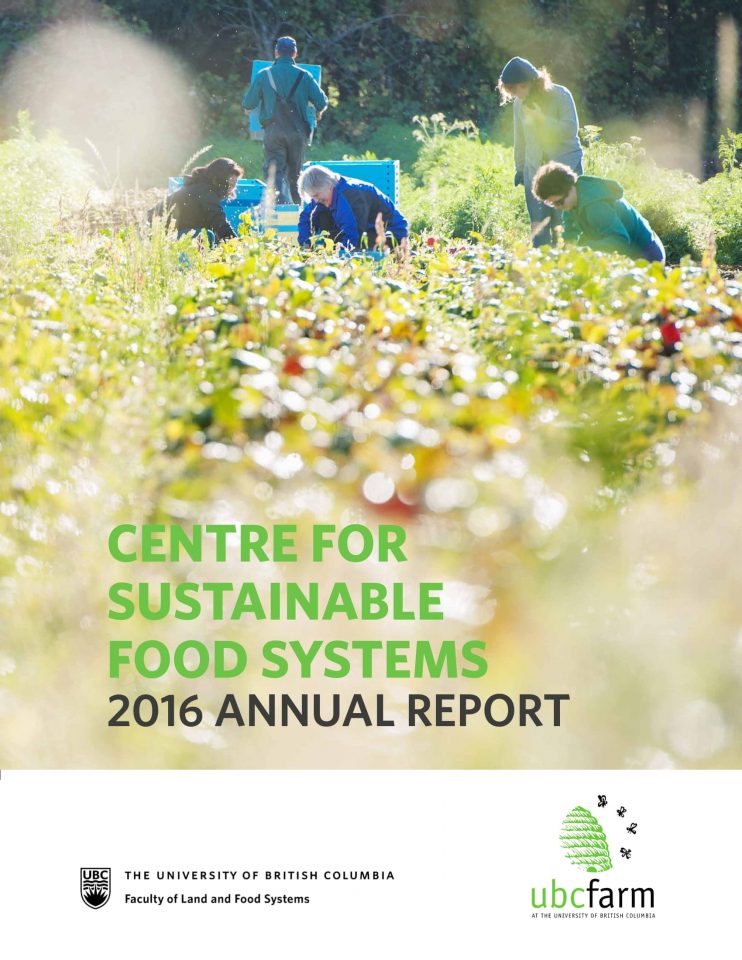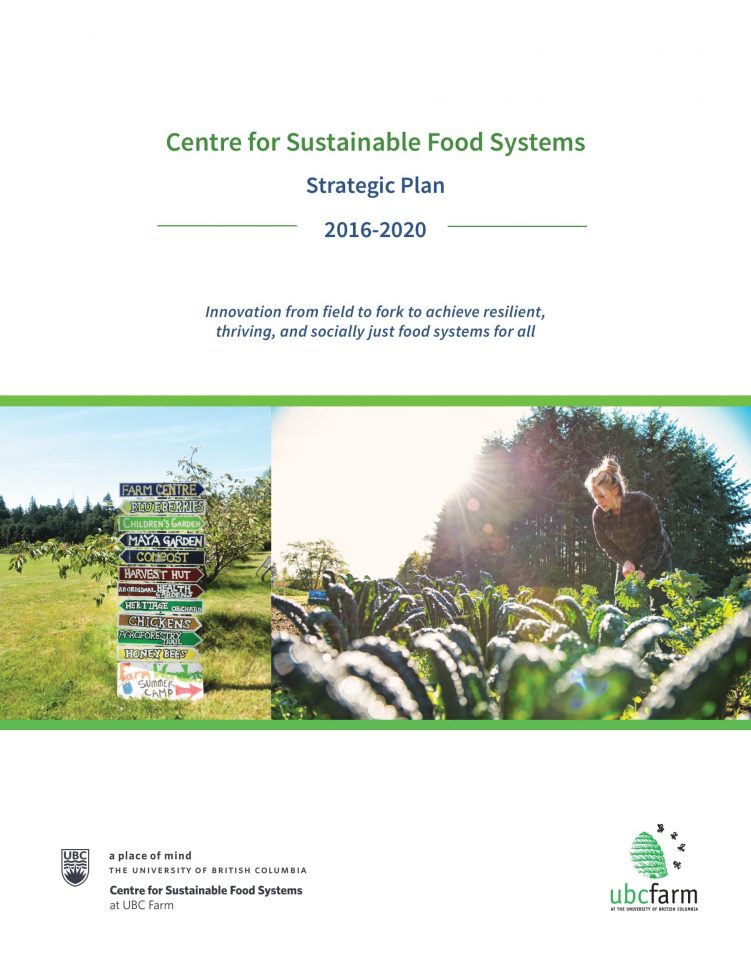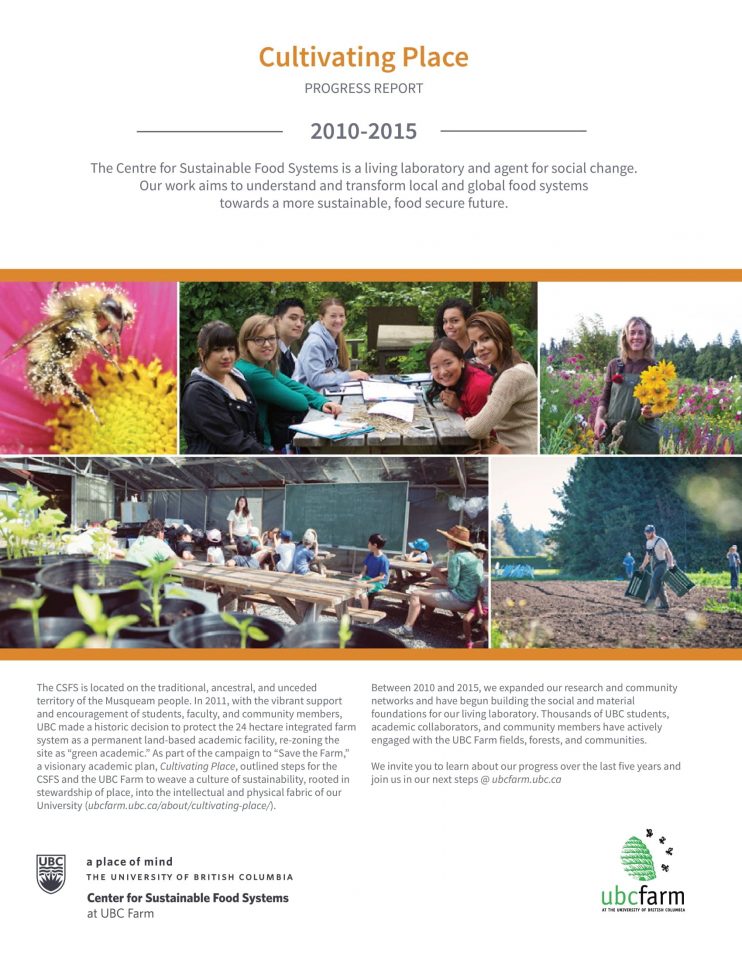About Us
We seek to create resilient, thriving, and socially just food systems for all.
The Centre for Sustainable Food Systems at UBC Farm (CSFS) is a teaching and research centre that builds community and design, facilitates and models sustainable food systems.
Our living laboratory is committed to finding solutions to local and global challenges facing food systems sustainability.
The Centre for Sustainable Food Systems
The Centre for Sustainable Food Systems (CSFS) comprises the research, teaching and cultivation activities at the UBC Farm, as well as sustainable food systems research and teaching that takes place across UBC campus, British Columbia, Canada, and around the globe. CSFS associate members work on the development of innovations in agroecosystem management for food security and ecosystem services, while honouring, respecting, and protecting diverse ecosystems and knowledge pathways within Indigenous and agrarian food systems.
Housed under the Faculty of Land and Food Systems, the UBC Farm has thrived since 2001 thanks to the UBC students, faculty and staff who worked tirelessly to demonstrate the need for a dedicated site for food systems learning, research, and food cultivation at UBC. The CSFS was established in 2011 to further this aim as the academic home for the UBC Farm, with a vision to spur innovation from field to fork to achieve resilient, thriving, and socially just food systems for all. The CSFS supports collaborative research, teaching and learning opportunities for UBC students, faculty, and staff as well as local and international academic and community partners.
The UBC Farm
The UBC Farm is the Centre for Sustainable Food System’s main research, teaching and learning space, located on the traditional, ancestral, and unceded territory of the hən̓q̓əmin̓əm̓-speaking xʷməθkʷəy̓əm (Musqueam) people.
Situated within a 90-year-old coastal hemlock forest, the 24-hectare UBC Farm was started by students in 2001 and since then our integrated organic farm and forest ecosystem has become a key part of UBC’s agroecology research and education as well as an important Vancouver food hub. The UBC Farm features cultivated annual crop fields, perennial hedgerows and orchards, pasture, Indigenous-led gardens, and forest stands.
The Farm is organically managed, and UBC Farm produce is certified organic through NOOA. We cultivate over 200 varieties of fruits, vegetables, and herbs, and also feature honey beehives.
Our History
To find out more about food systems learning at UBC and the story of the UBC Farm visit our History page and check out our two-episode podcast, Growing a Farm: The 20-year Journey of the UBC Farm to hear the voices of the people who started the UBC Farm and – ultimately – saved and protected it development.
Challenges and Opportunities
Our food system is in a moment of critical opportunity given the current global challenges of food insecurity, climate breakdown, biodiversity loss and inequity, and the need for truth and reconciliation with Indigenous communities. We do not have all the answers about how to emerge from these complex challenges, but we feel clear about the importance of places like the UBC Farm and the networks of supporters and changemakers that constitute the CSFS.
The CSFS is uniquely positioned to bring together students, faculty, and staff from across a globally renowned university and connect them to networks of farmers, policymakers, and local and Indigenous communities to develop solutions grounded by our connection to the land at the UBC Farm.
Our Vision and Values
Our Vision, Mission, Values, and Impact
Our Vision
Resilient, thriving, and socially just food systems for all.
Our Mission
To design, facilitate and model food system change through innovative research, place-based learning, knowledge mobilization, community building and stewardship of the UBC Farm.
Our Impact Goals
We aim to have an impact in four key areas: food security, climate, biodiversity, and decolonization.
Our Guiding Values
Long-Term Thinking
We consider the mixed legacies of past generations and the needs of future generations, keeping us accountable as we work to make the urgent changes needed today.
Land Stewardship
We see our role as shared caretakers of the land and recognize our interdependence with all species and people.
Collaborative Leadership
Working with a diversity of partners will help achieve the impact we want to see in the world.
Who do we aim to impact?
The campus community, growers, and learners.
Decolonization and Equity
Our Commitment to Decolonization and Justice, Equity, Diversity and Inclusion
The UBC Indigenous Strategic Plan
We recognize that we and UBC have much work to do in the area of anticolonial advancement. To that end, we will support our Indigenous partners with an intention to be allies and draw on existing Indigenous action frameworks, including the UBC Indigenous Strategic Plan (ISP) in what we do.
Equity Statement
As a member of the Sustainable Agriculture Education Association (SAEA), we support and subscribe to the SAEA’s Equity Statement.
“The Sustainable Agriculture Education Association (SAEA) affirms, above all, that food systems sustainability requires the realization of equity and justice. It works to support the principles of equality, dignity, and fairness rooted in the Universal Declaration of Human Rights of the United Nations. We share these values with the Inter-Institutional Network for Food, Agriculture, and Sustainability (INFAS) network, whose Statement on Equity in the Food System many of our members helped compose. The INFAS statement recognizes the environmental, social, and economic dimensions of sustainability. It places an explicit focus on dismantling structural racism in food systems, and on challenging the multiple forms of oppression — class, race, gender, nationality, among others — that serve as interrelated barriers to equity.”
Strategic Plan
Our Strategic Plan 2024-2029
Our new Strategic Plan has launched and our Actions Plans are underway. Learn more about the five-year plan and how you can help us meet our ambitious targets.

Strategic Plan 2024-2029
Our Progress
Annual Reports
Our Annual Reports capture the achievements and activities of our diverse programs and the milestones we have reached as an organization.
What We Do
Our Programs & Initiatives
Get a sense of the breath and depth of our work through our programs and initiatives and how they fit into our five new strategic areas.

Good Soil, Good Humans
A video showcasing our vision.
FAQs
Frequently Asked Questions
The UBC Farm is located on the Point Grey campus of the University of British Columbia (UBC), on the unceded ancestral territory of the hən̓q̓əmin̓əm̓-speaking xʷməθkʷəy̓əm (Musqueam) people.
A vision for a new integrated farm system on campus was first proposed by UBC students in 2000. After a decade of uncertainty regarding its long-term future, the UBC Farm embarked upon a new academic plan in 2010 called Cultivating Place, with commitments from the university to retain the integrated farm system as a land-based academic facility. In 2011, as a result of this plan, the Centre for Sustainable Food Systems was created to be a research and teaching centre with a global reach that encompasses the UBC Farm. Much of the learning and research activities of CSFS take place at the UBC Farm.
Read more about our history.
Find out more about our research.
Find out more about learning opportunities.
The UBC Farm sells produce through diversified avenues including: our Farm Markets, our CSA Program, and wholesale. Our produce sales directly support the educational programming and research activities of the Centre for Sustainable Food Systems at UBC Farm.
All 24 hectares of the UBC Farm are under organic management. All our produce is grown according to British Columbia Certified Organic Management Standards, and on May 1, 2016, the UBC Farm became certified organic through NOOA.
At UBC Farm, organic agriculture means that we rotate our crops to balance nutrients in the soil and discourage pests and disease. We use compost and green manure (cover crops) to add nitrogen and organic matter to the soil, suppress weeds, and prevent drought and soil erosion. We use beneficial insects or mechanical and manual methods to control pests and weeds, and we ensure animals have access to outdoors: fresh air, sun and access to pasture are essential for their health. Stop by to visit the Farm or join us for a tour (free tours meet at noon at our Saturday UBC Farm Farmers' Market) to learn more and see organic agriculture in action!
Read more about organic at thinkcanadaorganic.ca
For current and past research project, researcher profiles, and opportunities to collaborate, see our Research page.
Research is an integral part of the Centre for Sustainable Food Systems at UBC Farm and we wanted to make sure we could continue collaborating and innovating when we chose to become certified organic. Thankfully, the organic standards have exemptions for research that allow us to navigate this without compromising our organic status. This can help grow the organic community, provide much-needed research into organic practices, and continue to shape organic food systems locally and globally.
Chickens
The UBC Farm has maintained maintains seasonal flocks of open pasture, egg laying hens in the past. We also have honeybee hives maintained on site. Beyond domestic livestock, however, the Farm teems with wildlife biodiversity. By actively managing a diversity of habitat types with a strong emphasis on biodiversity and agroforestry, the Farm supports an amazing population of birds, insects, amphibians, and reptiles, as well as small and large mammals.
In agriculture, time is money. Because organic farms avoid the synthetic fertilizers, pesticides, fungicides and growth hormones used by many non-organic farms, we typically require much more labour (paid staff time) to produce and care for our crops, for example through pulling weeds by hand or with tools rather than by spraying herbicides. In Canada, subsidies exist that currently favour large-scale and non-organic farms; this is a great opportunity to lobby local and federal government to help support organic farmers more!
When people ask “Why is organic so expensive?” a great question to follow up with is: “Why is non-organic food so cheap?” Somewhere down the chain, some costs are being externalized, such as underpaid labourers or ecosystem services that are not being nourished and regenerated – for example, the depletion of nutrients in the soil without building them back up over time. At the UBC Farm, we are constantly assessing our prices to ensure we are matching the organic community and offering the fairest price we can while covering our own costs; while we understand that not everyone can afford organic, we want to help grow food systems in the future where there are less barriers for people to access organic food.
Thanks to the UBC Student’s Sustainable Food Access Fund, we are now able to offer a 10 per cent student discount on our produce for all UBC students. Students simply need to show their student ID card at any of the UBC Farm market stalls during our three weekly markets from June-October (this does not apply to other vendors at our UBC Farm Farmers' Market or our CSA programs).


